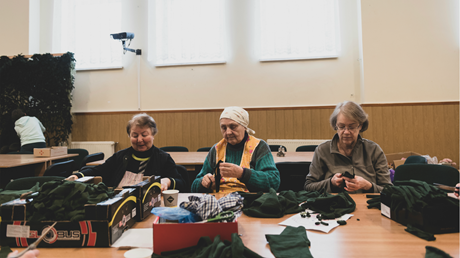Christians in Lviv work and pray for victory as they face their nation’s crisis head-on.

First they had to get a car.
As the threat of a Russian invasion grew on the horizon, some shrugged it off, thinking it unlikely. But Vika Aharkova, who ministered alongside her husband Vasyl among the 20,000 international students in Kharkiv, near the Russian border, “kind of knew it was going to happen,” she said.
It’s easy to delay when crisis is coming. It’s easy to think of the many plausible reasons the worst won’t happen. They were still praying for peace. But they also knew they needed to be prepared.
They needed a car.
“If we know there is going to be a war, we need to buy a vehicle,” Vika said. “So we can evacuate fast.”
Vika and Vasyl appealed to supporters for funds to buy a car, and two days later, funds in hand, Vasyl traveled to Lviv, in western Ukraine, to purchase the vehicle. He immediately drove back to Kharkiv—a 14-hour journey.
The invasion started eight days later, at 5 a.m. on February 24. At 5:30, Vika and Vasyl were in the car, each carrying just a single backpack.
By the time they left the city, they had five more people, with five more backpacks: Vasyl’s sister, a couple from their church, an elder’s teenage daughter, and a student from the medical university.
No one took any extra luggage, but they did make room for a cat.
They would drive nonstop to Lviv—this time a 36-hour journey. Many people from all over the country have fled to Lviv now. In the West, near the Polish border, it’s more secure.
Here many churches, and many evangelicals like the Aharkovs, have turned to face the crisis head-on.
Step onto the grounds of the Central Baptist Church, for example, and the place is abuzz. Parked in front is a bus that will take ...
from Christianity Today Magazine
Umn ministry


.gif)

.gif)
.gif)
